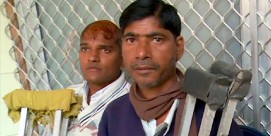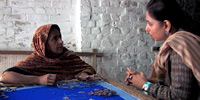FRED DE SAM LAZARO, correspondent: Few cities anywhere display a wider gap between haves and have-nots than Mumbai, or Bombay. Real estate is costlier here than in Manhattan. Yet two-thirds of this city of 16 million people live in slums—crammed spaces that are technically illegal and by most measures unfit or unsafe for human habitation.
It’s here that Jockin Arputham is a towering figure, even though he’s barely five feet tall. His efforts have helped nearly 40,000 families get out of dangerous and unsanitary improvised shelters to complexes like this one, which is now providing new homes for squatters who are living under electric towers. Those are due to be rebuilt and expanded.
(to Jockin Arputham): So you have 600 families here?
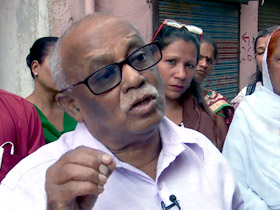
JOCKIN ARPUTHAM (Founder, Slum Dwellers International): Yes.
DE SAM LAZARO: How much of a dent does that make? Are there are many more families who still need to be rehabilitated?
ARPUTHAM: There are about 3,000 families to be rehabilitated in this kind of scheme.
DE SAM LAZARO: And this is just people who are squatting in electric towers?
ARPUTHAM: Yes.
DE SAM LAZARO: The apartments may not look like much—one 225 square feet room but made of brick and mortar instead of plywood or tarp. They have running water and something the majority of Bombay’s residents don’t—a private toilet.
Of all the indignities suffered by slum dwellers, Arputham says, none is more humiliating than not having a toilet, private or public.
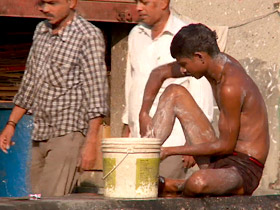
ARPUTHAM: It is the dignity! If you don’t have a toilet, what does that mean?
DE SAM LAZARO: You don’t have dignity.
ARPUTHAM: Exactly!
DE SAM LAZARO: Arputham has spent much of his adult life trying to gain recognition for slum dwellers as citizens in legitimate communities. He says they’ve long been unfairly stereotyped as lazy and criminal.
ARPUTHAM: Everybody, every house has one person meaningfully earning.
DE SAM LAZARO: Meaningfully employed?
ARPUTHAM: Meaningfully employed.
DE SAM LAZARO: And they come from all over the country?
ARPUTHAM: All over, all over the country.
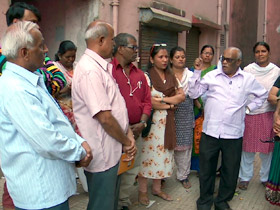
DE SAM LAZARO: Arputham came to this city 50 years ago from south India. He had almost no formal education but a facility for languages, picking up Hindi dominant in north India, the local Marathi, and functional English. He used these talents to organize neighbors into a group that's now global called Slum Dwellers International, taking advantage of their numbers, he says, to get the attention of an often indifferent government bureaucracy.
ARPUTHAM: I create a critical mass. This is my critical mass!
DE SAM LAZARO: They’ve used guerilla tactics—nonviolent, he insists—to push for their rights or basic amenities like water hook-ups. If the city ignores or takes too long to respond to their requests, Arputham takes the task on himself.
ARPUTHAM: I will break into the water tap giving the connection.
DE SAM LAZARO: You’re going to tap into the pipes?
ARPUTHAM: I’ve done it a thousand times. When the police come, I put children in the front, then women.
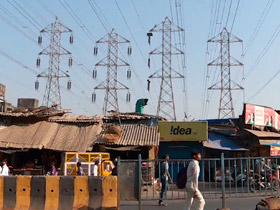
DE SAM LAZARO: Today, he says, there’s no trouble getting the electric utility to fund relocation for squatters who've lived under their towers or getting campaigning politicians to support the group's push for upgraded housing and especially public toilets.
ARPUTHAM: This is for little more than around 600 families.
DE SAM LAZARO: Six hundred families who don’t have a toilet now.
When he began building community-run public toilets like this one 25 years ago, the funds mostly came from foreign aid agencies, he says.
ARPUTHAM: Now slowly it has become the city’s responsibility. The city government, municipal corporation totally pays for the capital investment of this construction.
DE SAM LAZARO: So far they’ve completed or have contracts to build toilets serving some 600,000 people. Once built, they are run by the community supported by user fees, about two US cents per day for a family. A family—in this case Mamta and Dalsher Bidlan—is hired to maintain the facility in exchange for a small apartment above the structure.
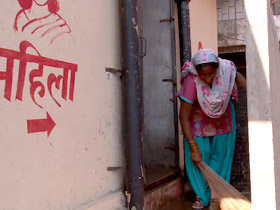
Mamta Bidlan says having a toilet nearby means a lot to women for whom this has long been a safety issue.
MAMTA BIDLAN (Toilet Manager): The women had to go a long distance before, and there were bad men hovering from outside that would create problems. Now it’s very easy for women to come here.
DE SAM LAZARO: Arputham credits much of the organization's success to its mostly female volunteers. Women have the right priorities for their family, he says, and they are keenly tuned in to goings-on in the community.
ARPUTHAM: If you want a qualitative change in life, you have to take it from women. If you don’t recognize that, you are lost.
DE SAM LAZARO: What kinds of things, specifically?
ARPUTHAM: Everything starting from how to manage your money, how to earn your money, how to live. Women have all this quality, which men don’t have.
DE SAM LAZARO: For their part, the women volunteers—most of them stay-at-home spouses by tradition as much as choice—say their lives have been transformed.
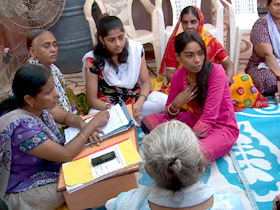
MALATI AMRE (Volunteer): Women have gotten ahead now. In years past, women used to be afraid of leaving the home. We've been able to get them out of the home by forming an organization.
POOJA RAO: I used to be afraid of leaving the house, afraid of living in the neighborhood. Now I’m ready to do much more. He's given us the courage. He’s taught us how to organize ourselves, how to deal with the police.
DE SAM LAZARO: The police who were once indifferent or even hostile are now much more receptive, and in fact, partners with the slum dwellers group—providing space to set up a new system of arbitration so disputes over property or domestic issues don’t escalate to require arrests or court intervention.
Arbitration Hearing: Okay, we’ve heard your story. Now we’ll invite him in and see what he has to say.
Woman: We have people from all religions in our organization—Muslims, Hindus—no problems whatsoever.
ARPUTHAM: I think part of my teaching comes from the church. I think quite a lot. In my work, I practice.
DE SAM LAZARO: Arputham was raised Roman Catholic—a small minority in a land of many faiths and, often, religious tension. However, Slum Dwellers International, a group that now has chapters in 34 countries, says the common cause slum dwellers face easily dwarfs any divisions of ethnicity or faith.
For Religion & Ethics NewsWeekly, this is Fred de Sam Lazaro in Mumbai, India.







